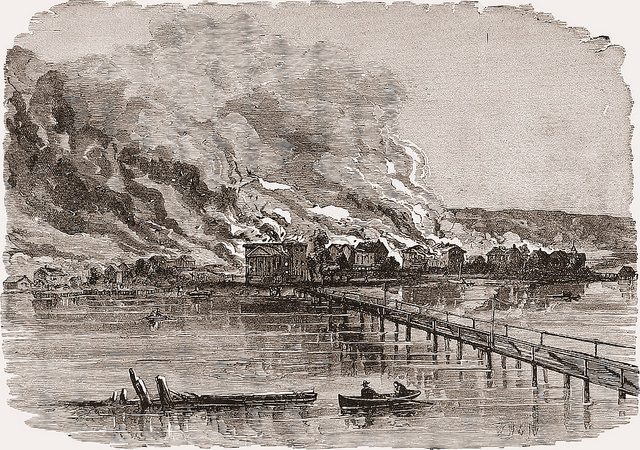August 7, 1861 – Harper’s Weekly
WE illustrate on page 550 the BURNING OF HAMPTON by the rebels under General Magruder. The correspondent of the Associated Press thus describes the scene:
A few minutes past midnight General Magruder, with about five hundred rebels, some of them belonging in Hampton, entered the town and immediately fired the buildings with torches. The greater part of the five hundred houses were built of wood, and no rain having fallen lately, the strong south wind soon produced a terrible conflagration. There were perhaps twenty white people and double that number of negroes remaining in the town from inability to move, some of whose houses were fired without waking the inmates. They gave Wilson Jones and his wife, both of them aged and infirm, but fifteen minutes to remove a few articles of furniture to the garden. Several of the whites and also of the negroes were hurried away to be pressed into the rebel service. Mr. Scofield, a merchant, took refuge in a swamp above the town. Two negroes were drowned while attempting to cross the creek. A company of rebels attempted to force the passage of the bridge, but were repulsed with a loss of three killed and six wounded.
The fire raged all night. The greater part of the rebels withdrew toward morning, and at noon to-day, when I visited the place, but seven or eight buildings were left standing.
The glare of the conflagration was so brilliant that I was enabled to write by it. A more sublime and awful spectacle has never yet been witnessed. The high south wind prevailing at the time fanned the flames into a lurid blaze, and lighted up the country for miles and miles around. The fire broke out between eleven and twelve o’clock P.M. on the 7th inst. It appears that a short time previous our pickets from Colonel Max Weber’s Twentieth Regiment were fired upon by a company of rebels, but by dropping on their faces our troops did not sustain any loss. They, however, returned the fire with deadly aim from their trusty rifles, which must have made sad havoc among the enemy. We could see the rebels passing from one house to another, by the glare of the light, and use the incendiary’s torch with effect. Every building in this once beautiful village is destroyed, with the exception of the Military Academy, and that can not possibly be saved.
Our camp was alarmed instanter, and the troops got under arms. An attack from Fox Hill was momentarily expected, and Colonel Weber’s regiment were immediately supplied with extra ammunition, and sent out in all directions as pickets, patrols, and skirmishers. They have done their work bravely and efficiently. Two companies are now here watching for rebels and guarding the bridge from being fired. The bridge will be saved. It is dismantled about a rod from the farther shore, and terminates there in a barricade of boards, behind which a portion of our picket was stationed when fired on by the enemy. Captain Strouple, of the Twentieth Regiment, has just started across to the barricade with six men in the face of the flames and foe. He is anxiously watched from this side, as it is expected that he will be fired upon. The light is as bright as day, and the figures of men are seen reflected in the water. They have reached the barricade in safety.
The rebels have done their work effectually, nothing is now left to mark the once beautiful Hampton but the charred, towering chimneys, looming up in the distance, as monuments of the dastardly work of the rebels.
